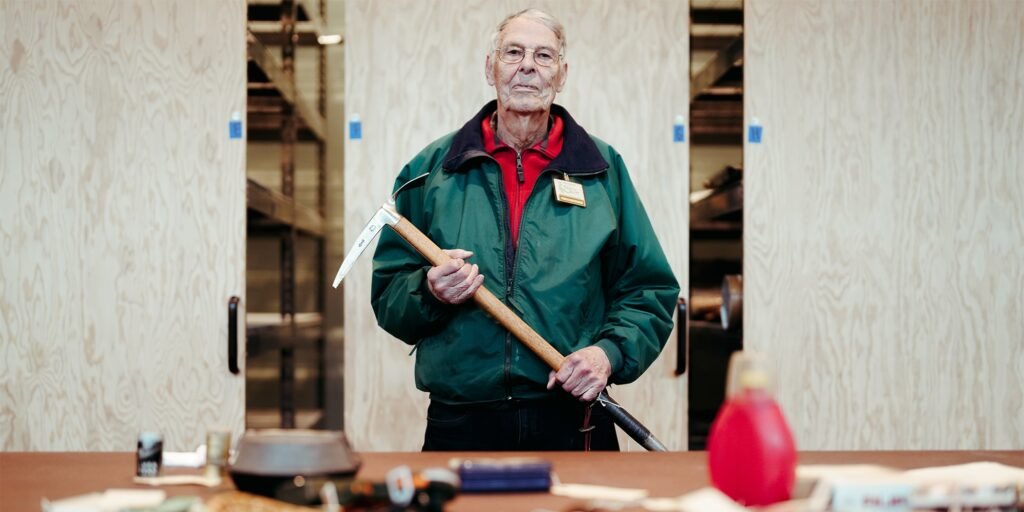Gary Rose got here into work the opposite day. This was uncommon, contemplating he’s been retired from REI for almost 30 years. He walked in with the gradual however assured gait of a person who, although almost 90 now, has been energetic his complete life. On a desk lay items of substances, every bearing a tag with Rose’s title and the 12 months they’d been purchased as objects for the co-op to promote:
A plastic canteen.
Youngsters’s bentwood snowshoes.
Historical ice screws.
An altimeter.
Rose was a significant purchaser for REI for many years, procuring objects from everywhere in the world. “Are any of this stuff that you just sourced?” requested Will Dunn, REI historian and impression communications program supervisor, who had positioned them out for Rose to see.
“Oh yeah,” Rose replied.
He picked them up in flip: Pitons. A Primus range. Carabiners. Avalanche transceivers from the Nineteen Seventies and ‘80s. The slide rule that Rose used earlier than computer systems. His face took on the look one offers an previous good friend seen at a highschool reunion after too a few years—first recognition, then delight, as reminiscences got here again. He hadn’t laid eyes on the objects in not less than 1 / 4 century.
Rose, who labored for REI from 1960 to 1996, is a dwelling hyperlink to REI historical past, a key member of that second era of leaders who discovered on the ft of founders Lloyd and Mary Anderson after which carried ahead the concepts and beliefs of the co-op. Rose began as one of many co-op’s earliest workers earlier than changing into a key purchaser. As curiosity in outside recreation boomed beginning within the early Nineteen Seventies, his selections actually stocked the cabinets and made REI an indispensable cease.
“If anybody ever deserved the designation of REI icon, it’s Gary Rose,” Mike Boshart, who labored for REI for a number of years and served briefly as Rose’s assistant within the mid-Eighties, wrote in an e mail.
Rose was visiting the co-op’s new Artistic Hub in Seattle’s SoDo district at Dunn’s invitation. Right here, designers, prototypers, engineers and product testers collaborate on the way forward for REI Co-op merchandise.
As he entered, Rose walked previous a room crammed with racks of colourful clothes—shirts and jackets for spring 2025—and one other crammed with mountain bike frames. Rose appeared round him, amazed. In the midst of the Artistic Hub sits the Dwelling Archive, overseen by Dunn—an association that clearly indicators the will that REI’s previous continues to tell and enrich its future.
From the desk, Rose lifted an ice axe with an aged ash shaft and a metal adze. He turned it with the appraising arms of a former mountain information, glad to see his title stamped within the steel. (He’s climbed Mount Rainier 45 occasions, from seven routes.)
“Grivel.” He mentioned the model with no need to look. “A great high quality one. However heavy. We’ve shortened ‘em up, too.”
Born and raised in Edmonds, Washington, he’d fallen laborious for the mountains at age 15 whereas taking a climbing class from The Mountaineers, whose clubhouse was subsequent door to a younger REI. After graduating from the College of Washington, Rose turned a summit information on Mount Rainier. On his days off he returned to the Seattle space to run errands and wash garments. He’d additionally typically swing by REI to switch a bit of substances, and acquired to know Jim Whittaker, then the gross sales supervisor. Whittaker labored beneath co-founder Lloyd Anderson. (Whittaker, in fact, went on to be the co-op’s second president and CEO.)
“I occurred to be in there one time within the fall and I mentioned, ‘Are you gonna have any openings for job alternatives?’ And [Jim] mentioned, ‘Effectively, certainly one of our salesmen goes again to high school, so we’ll have a gap. In the event you’re , come on in.’”
“That was the primary of October, 1960. And I spent the following 36 years there.”
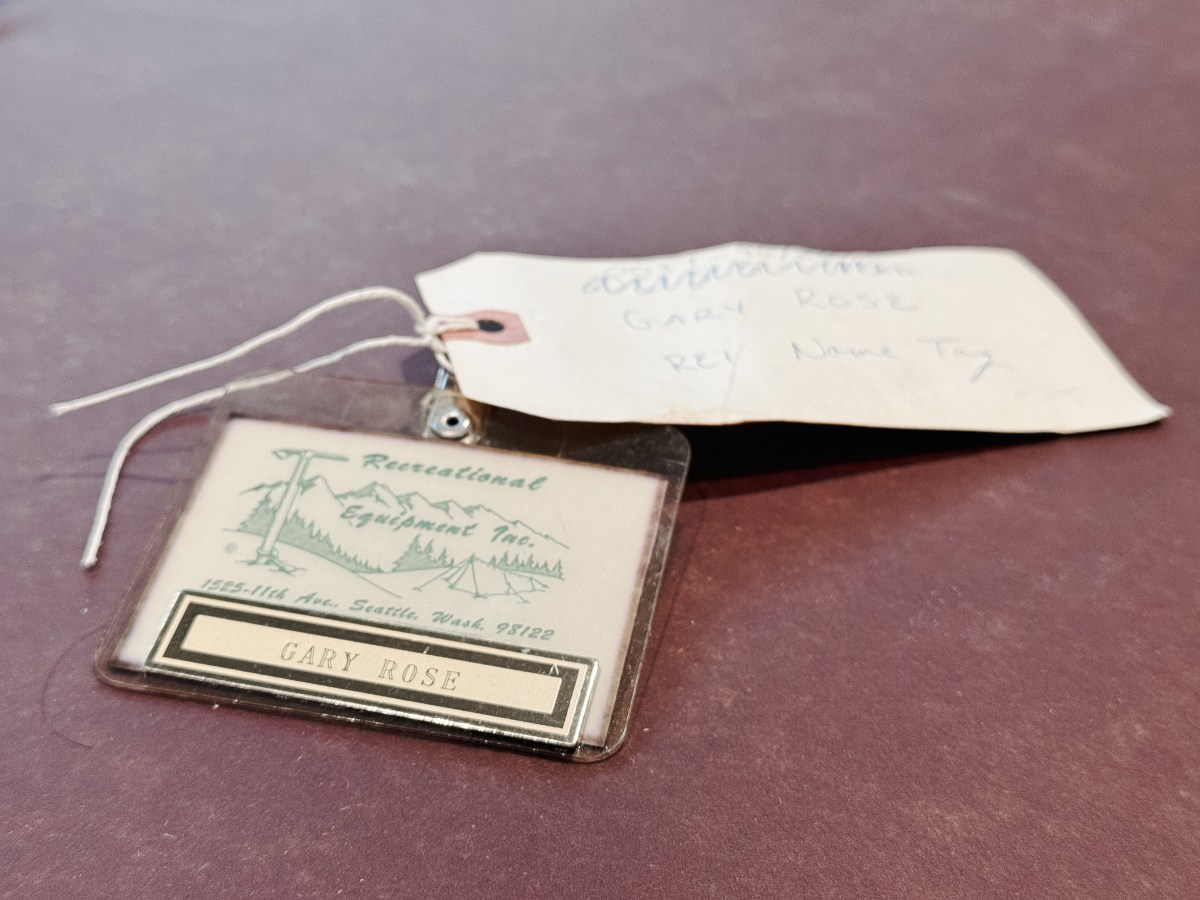
What job did he do at first?
“Sweep the ground,” Rose replied and chuckled.
“You had been simply form of a jack-of-all trades,” he mentioned. “Typically I’d work on the money register. Typically I’d assist the shoppers; inventory cabinets.”
REI stocked principally laborious items for climbing mountains on the time, together with dehydrated meals and Sno-Seal for waterproofing. Again then, climbing ropes got here in big spools of Manila rope. The salespeople spent numerous their time chopping coils of rope for members or making crevasse slings. Rose remembered their shortcut: If a buyer wished 150 ft of rope, they’d run the rope from the spool all the way down to the tip of the corridor, to the maps, to the map of Chiwaukum Peak, after which double it again.
The shop was positioned above the Inexperienced Apple Pie Café at sixth Avenue and Pike Road downtown and there was no freight elevator, Rose recalled. So “every little thing needed to go up the steps.” The co-op wholesaled Vibram® boot soles from Italy to cobblers round city. The heavy rubber soles arrived in huge picket crates that needed to be wrestled up the stairway. He laughed on the reminiscence. “They had been a gut-buster all proper.”
More often than not, although, “I beloved working there,” Rose mentioned. “You actually acquired acquainted with the members. The identical folks got here again in, again in, again in,” he mentioned. “I made numerous mates. … It was a detailed group of climbers.”
Rose’s profession as a purchaser occurred almost accidentally not lengthy after he began.
“Lloyd did a lot of the shopping for,” he mentioned. “I went to him one time and I form of shot my mouth off.” In his view, Lloyd at all times appeared to purchase an excessive amount of 16mm movie. The leftovers would expire, Rose informed him, they usually’d need to throw it away. “I believe it most likely made Lloyd a bit mad, form of questioning him.
As a result of he mentioned one thing like, ‘I don’t know something about movie. Why don’t you purchase it any more?’”
So Rose began shopping for the movie. Fairly quickly he was shopping for much more issues, after which he was spending all his time shopping for as a substitute of serving to clients on the ground. His tasks grew to buying “no matter Lloyd didn’t purchase.”
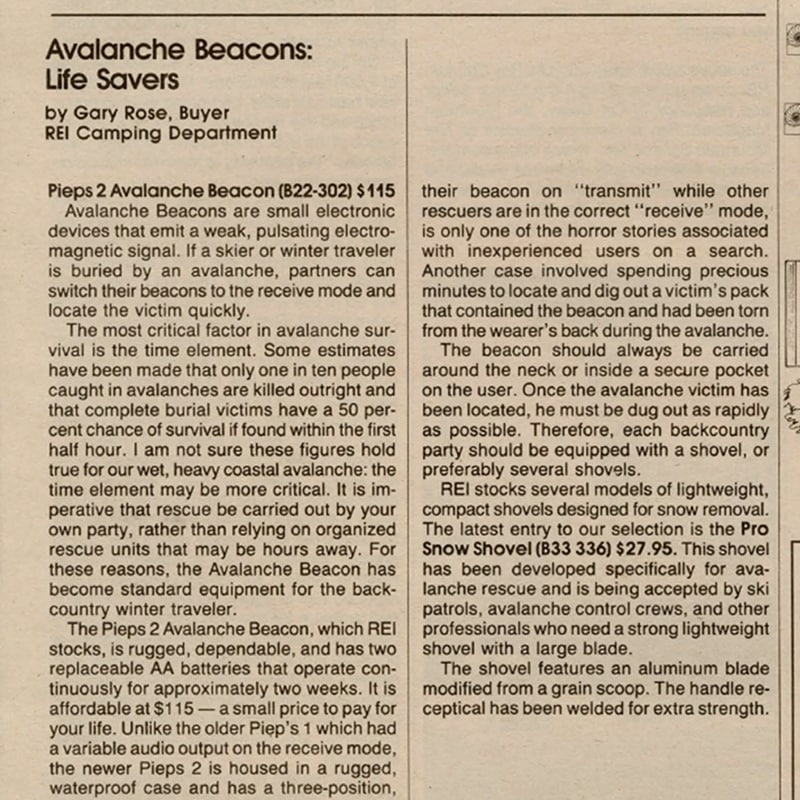
Rose doesn’t brag about his profession; he credited his promotion to not his acumen however to the shop’s booming enterprise on the time. However there’s little doubt he turned good at it. What neither man knew, then, was that moments like this had been indicators of the following era of leaders beginning to take the reins.
And between them, REI was sniffing out and importing transformative gear such because the Svea 123 tenting range, the primary compact range to make use of white gasoline. (The all-gold Svea roared like a jet engine within the woods; the late author Harvey Manning known as it “the Swedish hand grenade.
Rose was “protector of the soul of the corporate throughout years of dramatic change,” Boshart says. “A great actuality examine on what was really sensible to execute, Gary could possibly be an understated however extremely perceptive critic of recent initiatives, particularly if we began to get forward of ourselves.”
In 1964, Rose traveled to Europe with Lloyd and Mary to hunt out merchandise. It was the primary of many such journeys. Rose remembered one particularly with Lloyd: The 2 rented a VW Beetle and drove from southern Italy to just about the Arctic Circle in Sweden, visiting range firms, shoemakers and tent producers, and climbing alongside the way in which. In the future they climbed Switzerland’s Jungfrau, descending too late to catch the final prepare down the mountain. They needed to spend the evening within the cog railway’s higher station.
By the early Nineteen Seventies the outside business was quickly altering. The provides of Military surplus gear that for many years crammed cabinets of the early co-op—the 5-cent tubes of sunscreen, the wool pants—had been drying up. In the meantime, the ‘60s, with their environmental awakening, had been sending a brand new era of Individuals into the woods and mountains. REI nearly couldn’t deal with the quantity of recent clients, Rose recalled. Fortunately, this meant a wave of recent product innovation. That made the position of a savvy purchaser extra vital than ever.
However was the stuff adequate for patrons, who relied on it?
On the Artistic Hub, Rose walked by a door. An indication overhead learn, “We Take a look at the Gear.” That is the Magnusson Take a look at Lab, the place since 1971 the co-op has put objects—from sleeping baggage to tent poles—by their paces to verify they’d final.
Jim Hollenbeck, the Magnusson Lab Store lead, confirmed Rose the computer-controlled sizzling plates, the tear-strength machines, the environmental chamber that may go from -85°F to 185°F.
Rose appeared round.
“What an enchancment,” he mentioned. His voice held the wistfulness of the previous purchaser who wished he’d had such assist in his day.
How did he and REI decide high quality again within the Sixties? somebody requested.
“We’d bend it—and break it if we might!” Rose replied, and he laughed.
“It’s form of what we nonetheless do,” Hollenbeck replied.
Rose labored with Cal Magnusson, a legend throughout the co-op who ran product testing and whose title the lab now bears. Magnusson was sensible and frugal and recognized generally to plan testing machines out of junkyard supplies.
“I bear in mind Cal made an abrasion tester for webbing and ropes,” mentioned Rose. “He went to a junkyard and acquired an previous crank case.”
“A Peugeot engine block,” confirmed Hollenbeck.
“I used to be down within the lab in the future,” mentioned Rose, “and I mentioned, ‘Cal, for those who’d solely gotten a V-8 engine, you can have labored twice as quick!”
Gear high quality did enhance, Rose recalled. However, he mentioned, “It didn’t occur in a single day.”
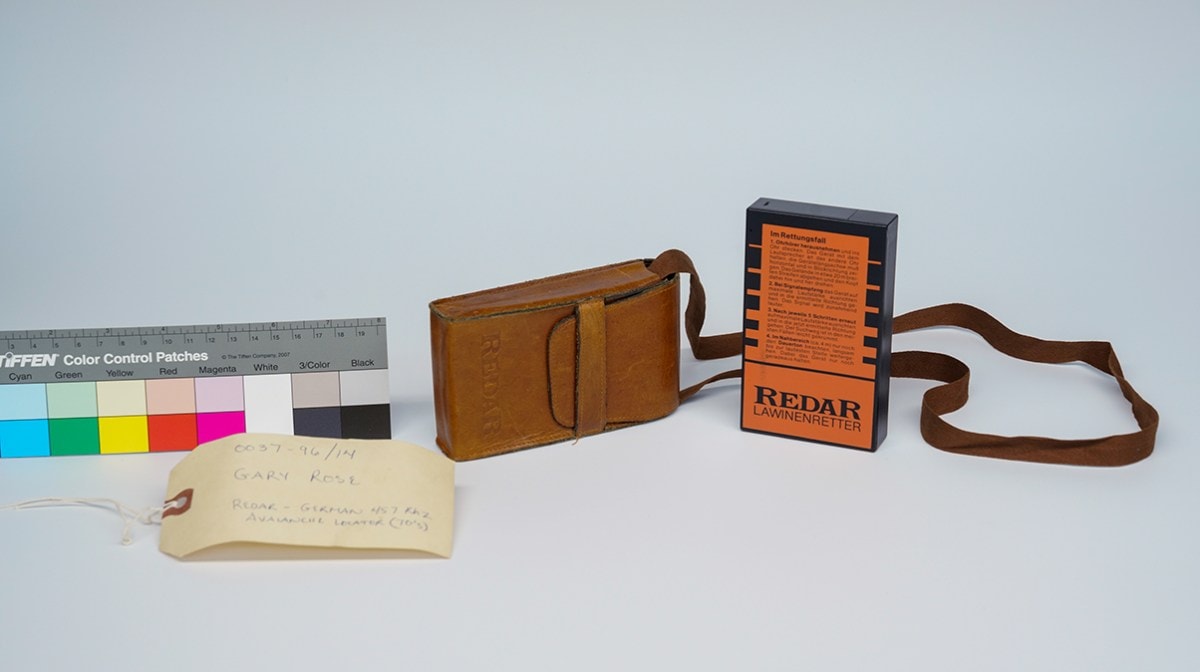
By the mid-Nineteen Seventies Rose was chargeable for bringing in a wide range of merchandise: batteries, devices, packs and rucksacks, gear for water sports activities, tentpoles, pegs, stoves, snowshoes. “The largest buy order that I ever wrote was for over 1,000,000 {dollars}’ price of down” so {that a} provider, Washington Quilt Firm, might make sleeping baggage for the REI label, he mentioned. “They used to snort at me and name me the Feather Service provider.”
There was a thrill to the hunt for the following helpful merchandise. What sort of devices might they purchase to make the outside expertise higher for folks? “If we didn’t have it, and also you discovered it and ended up placing it on the shelf, you bought satisfaction out of it.”
Think about the avalanche shovel: One which Rose had seen in Sweden didn’t impress him a lot; it was clunky and heavy. So he labored with a provider in Bellevue, Washington, to create a folding shovel for REI. The completed product match neatly on the aspect of a pack and the blade might tilt. “Boy, you can actually transfer numerous snow with it, for those who had been digging a cave, or digging a buried sufferer out of an avalanche,” he mentioned. “They had been fairly widespread.”
Not each thought labored out. “We had losers, that’s for positive,” he mentioned (that chuckle, once more).
For a time, REI offered insect repellent manufactured from 100% DEET—about 3 times what’s thought of essential to discourage biting bugs and what most different manufacturers include. “It was actually highly effective stuff,” Rose mentioned. “The mosquitoes, they wouldn’t even land.
“I bear in mind we acquired a criticism one time. Some man is available in; he’d purchased a bottle of that and he’d left it on the dashboard of his automobile, and it ate the plastic off. I believe it was an insurance coverage declare. That they had to purchase him a brand new dashboard.”
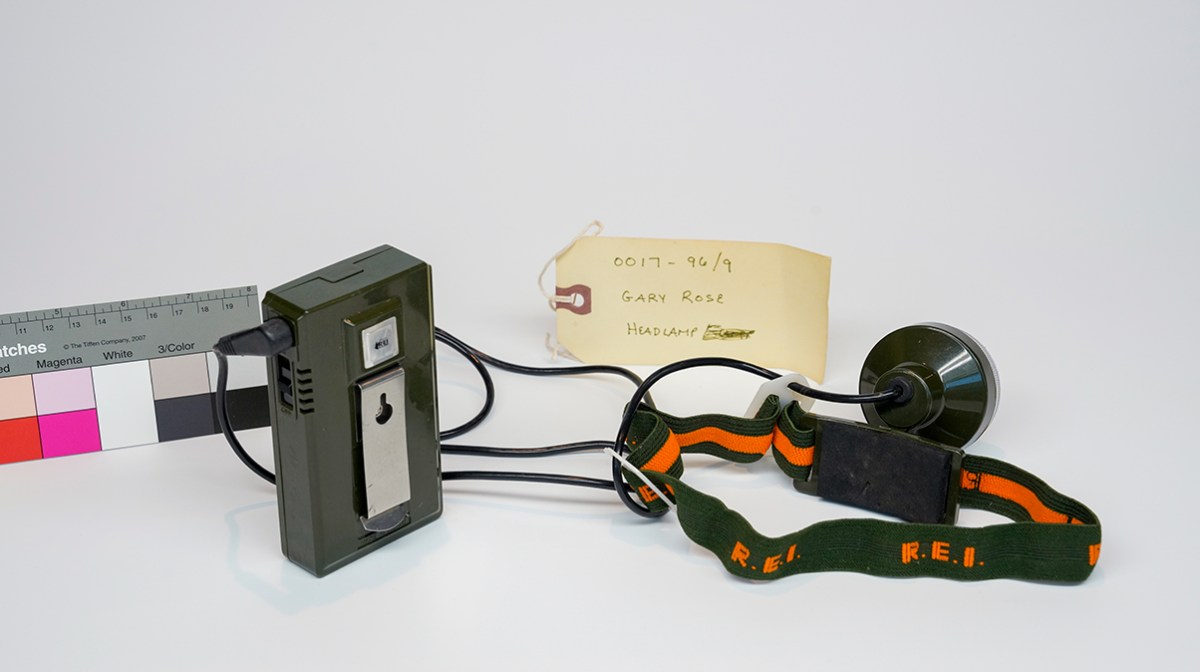
Rose retired from REI in 1996. By that point, he was the tenting purchaser. “It was all of the penny-nickel-dime objects—whistles, you title it. Lapel pins,” he mentioned in his typical understated means. Pressed, he acknowledged that “it was really one of many greatest departments, for greenback gross sales, as a result of they’d so many alternative objects.”
Says Boshart of his former mentor, “Gary knew nearly every little thing in key areas, and was glad to overtly share with out making you’re feeling silly for asking…. Once we moved to doing regional retailer excursions and product clinics, workers held on Gary’s each phrase.
“Individuals nonetheless say with pleasure: ‘I labored with Rose.’”
By the point he retired, one of many greatest adjustments Rose observed was how trendiness had entered the world of out of doors gear. “It appeared like what was sizzling final 12 months, doesn’t promote this 12 months. It was at all times leaping to one thing new.”
On the Artistic Hub, it was time to go. Dunn informed Rose he’d like to see that avalanche shovel someday—he’d by no means heard of it—and maybe take an image of it for the Dwelling Archive. And he invited Rose again anytime.
Rose picked up the ice axe yet another time and smiled for the digital camera. Then he headed out into the afternoon sunshine.
